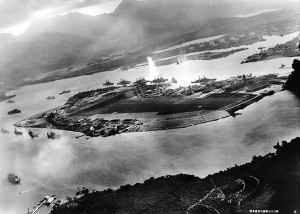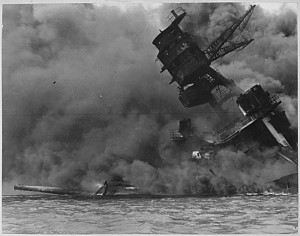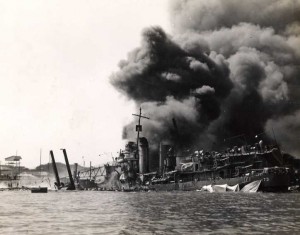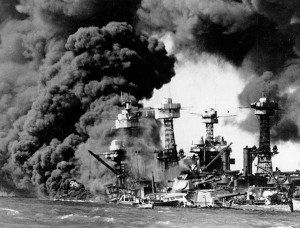
 Whether people remember the date or not, I think that most people know that the attack on Pearl Harbor was what took the United States into World War II. Negotiations with Japan had broken down, and President Franklin Roosevelt and his advisors knew that in all probability, the Japanese would attack the United States. Still, nothing was done to increase security at key points, like the naval base at Pearl Harbor, Hawaii. This was especially an important base, because of it’s location. It was a place that early warning could have been given to the mainland, or where an attack could have been thwarted, but as often happens in government, the leaders don’t want to scare the nation, so they try to keep things from them…a plan the is fraught with folly. The best weapon a nation can possibly have is preparedness.
Whether people remember the date or not, I think that most people know that the attack on Pearl Harbor was what took the United States into World War II. Negotiations with Japan had broken down, and President Franklin Roosevelt and his advisors knew that in all probability, the Japanese would attack the United States. Still, nothing was done to increase security at key points, like the naval base at Pearl Harbor, Hawaii. This was especially an important base, because of it’s location. It was a place that early warning could have been given to the mainland, or where an attack could have been thwarted, but as often happens in government, the leaders don’t want to scare the nation, so they try to keep things from them…a plan the is fraught with folly. The best weapon a nation can possibly have is preparedness.
December 7, 1941 was a beautiful Sunday in Hawaii, 75 years ago today, and many military personnel had been given passes to attend church services off base. At 7:02am, two radar operators spotted large groups of aircraft in flight toward the island from the north, but with a flight of B-17s expected from the United States at the time, they were told not to sound an alarm. At 7:55am Hawaii time, a Japanese dive bomber bearing the red symbol of the Rising Sun of Japan on its wings appeared out of the clouds above the island of Oahu. Behind it came a swarm of 360 Japanese warplanes, descending on the US naval base at Pearl Harbor in a ferocious attack. The United States was unprepared, and the surprise attack struck a critical blow against the US Pacific fleet drawing the United States irrevocably into World War II.
In an attack that lasted just under two hours, the Japanese rendered much of the Pacific fleet useless, including five of eight battleships, three destroyers, and seven other ships that were sunk or severely damaged, and more than 200 aircraft that were destroyed. A total of 2,400 Americans were killed and 1,200 were wounded, many while scrambling in a valiant attempt to repulse the attack. Japan’s losses were some 30 planes, five midget submarines, and fewer than 100 men. Fortunately for the United States, all three Pacific fleet carriers were out at sea on training maneuvers. These giant aircraft carriers would exact their revenge against Japan six months later at the Battle of Midway, reversing the tide against the previously invincible Japanese navy in a spectacular victory…a beating that Japan would not forget.
The day after Pearl Harbor was bombed, President Roosevelt appeared before a joint session of Congress and declared, “Yesterday, December 7, 1941…a date which will live in infamy…the United States of America was suddenly and deliberately attacked by naval and air forces of the Empire of Japan.” After a brief and forceful speech, he asked Congress to approve a resolution recognizing the state of war between the United States and Japan. The Senate voted for war against Japan by 82 to 0, and the House of Representatives approved the resolution by a vote of 388 to 1. The sole dissenter was Representative Jeannette Rankin of Montana, a devout pacifist, who had also cast a dissenting vote against the United States entrance into World War I. Three days later, Germany and Italy declared war against the United States, and the United States government responded in kind. The American contribution to the successful Allied war effort spanned four long years and cost more than 400,000 American lives.
I have never personally been to Pearl Harbor, but I am told that the Arizona Memorial, that stands above the sunken ship, that is grave to the brave men who died inside, displays a feeling of sadness, and of being on 
 hallowed ground. It is a feeling I felt when I walked through the cemetery at Gettysburg. The men who died there…who bravely gave the ultimate sacrifice deserve the respect of those who would come to visit. I do not believe in ghosts, but I do believe that God gives cemeteries, in general, and military cemeteries especially an air of quiet honor reserved for the dead. Let us never forget that our greatest weapon in all areas of life is preparedness.
hallowed ground. It is a feeling I felt when I walked through the cemetery at Gettysburg. The men who died there…who bravely gave the ultimate sacrifice deserve the respect of those who would come to visit. I do not believe in ghosts, but I do believe that God gives cemeteries, in general, and military cemeteries especially an air of quiet honor reserved for the dead. Let us never forget that our greatest weapon in all areas of life is preparedness.


Leave a Reply